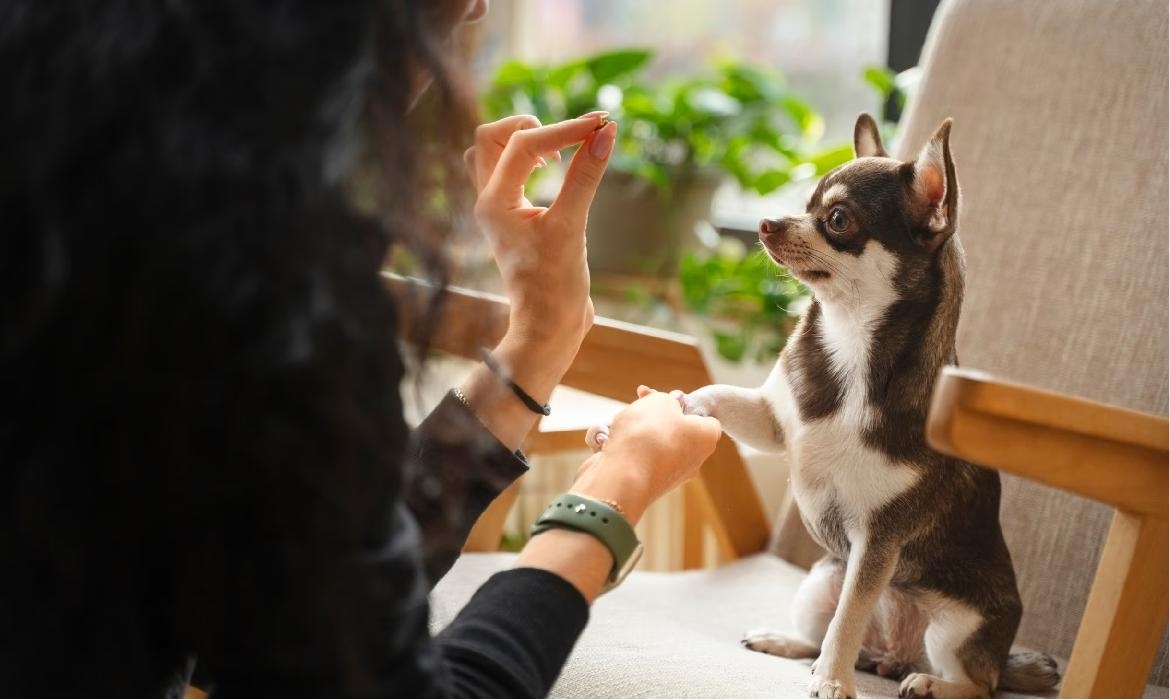Come educare un cucciolo
L’educazione di un cucciolo dipende dall’ambiente nel quale vive, dalla socializzazione con persone o altri animali e dall’addestramento diretto.
Educare un cucciolo e aiutarlo a diventare un cane sicuro di sé non è facile. In questo articolo ti spiegheremo passo dopo passo come addestrare il tuo cucciolo in modo efficace e divertente!
Educare un cucciolo è un compito importante e impegnativo, ma anche molto gratificante. Un cucciolo ha bisogno di imparare le regole di base della convivenza, come il rispetto degli spazi, la pulizia, l’obbedienza e la socializzazione. Per educare un cucciolo in modo efficace, ci sono alcuni principi da seguire:
Sii coerente: stabilisci delle regole chiare e applicale sempre, senza eccezioni. Non confondere il cucciolo con messaggi contraddittori o cambi di umore. Usa sempre lo stesso tono di voce e le stesse parole per comunicare con lui.
Sii positivo: rinforza i comportamenti desiderati con delle ricompense, come le lodi, le carezze o i premi alimentari. Evita di usare la violenza o le punizioni eccessive, che possono danneggiare il rapporto di fiducia tra te e il cucciolo. Se il cucciolo fa qualcosa di sbagliato, correggilo con fermezza ma senza urlare o picchiarlo.
Sii paziente: non pretendere che il cucciolo impari tutto subito. Ogni cane ha il suo ritmo e le sue capacità di apprendimento. Rispetta i tempi del cucciolo e non forzarlo a fare cose che non è pronto a fare. Ripeti gli esercizi con calma e costanza, senza frustrarti o demoralizzarti.
Sii divertente: rendi l’educazione del cucciolo un’esperienza piacevole e stimolante per entrambi. Usa il gioco come strumento di apprendimento e di rafforzamento del legame.
Scegli dei giochi adatti all’età e alla taglia del cucciolo, che non siano troppo violenti o pericolosi. Alterna i momenti di gioco con quelli di riposo e di relax.
Seguendo questi principi, potrai educare un cucciolo in modo efficace e armonioso, creando una relazione basata sull’amore, il rispetto e la complicità. Un cucciolo educato sarà un cane felice ed equilibrato, che ti darà tante soddisfazioni e gioie.
Quando iniziare e cosa insegnare al cucciolo
L’educazione del cucciolo inizia già a 7-8 settimane con insegnamenti di base: siediti resta, vieni.
- Inizia con il dirgli "siediti"
- Usa un bocconcino per invogliarlo a sedersi
- Una volta seduto, dagli un premio
Abitua il cane alla cuccia
Il cucciolo deve iniziare e considerare la sua cuccia come un posto sicuro e tranquillo. Inizia portandolo nella cuccia per intervalli di 10 minuti nel momento in cui ti sembra più predisposto. Offrigli una ricompensa per farlo restare nella cuccia.
Insegna al tuo cucciolo a non mordere
A questa età i cuccioli iniziano ad esplorare a pieno il modo che li circondo, portandosi alla bocca e mordendo tutto ciò che trovano. Per questo è importante insegnargli a non mordere tutto e tutti. Se il tuo cane inizia a morderti reindirizzalo verso un oggetto più appropriato da mordere, come un giocattolo.
Abitua il cucciolo fare i bisogni fuori casa
Inizia con portare fuori il tuo cucciolo al mattino, dopo aver mangiato, e dopo il gioco e i sonnellini durante il giorno. A questo punto dovrebbe iniziare a sviluppare autocontrollo dei propri bisogni. Dai un premio al tuo cucciolo ogni volta che va in bagno all'aperto.

